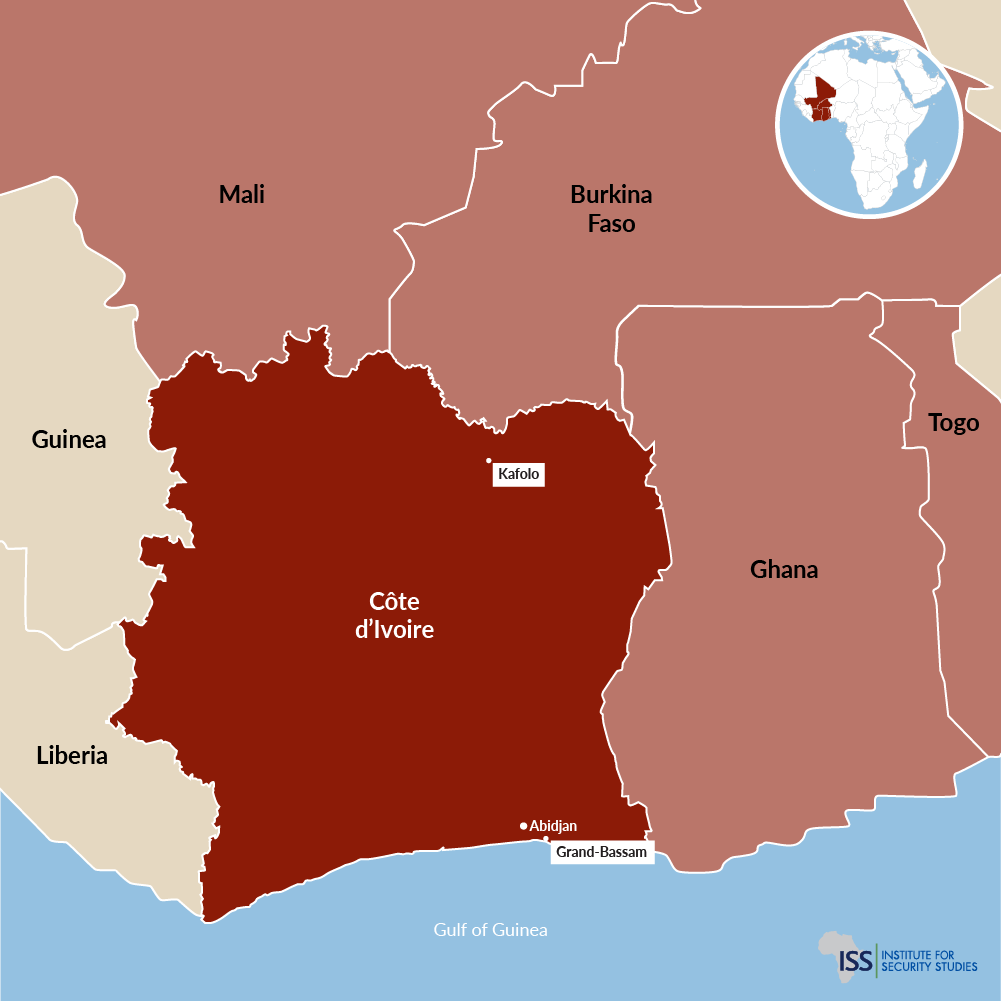ISS TODAY OP-ED
Côte d’Ivoire makes vital gains in countering, diminishing violent extremism

The threat isn’t over, but the spread has been contained by adapting and balancing military and social responses.
No significant terror attacks have been reported in northern Côte d’Ivoire over the past two years, suggesting that its approach to addressing the problem has been effective. With many other states in West Africa still facing a growing threat, what is the country doing right?
Côte d’Ivoire’s border area with Burkina Faso was under substantial pressure from violent extremist groups between 2020 and 2021. Almost 20 attacks and incidents attributed to these groups were recorded in that period. These included attacks against positions and convoys of the defence and security forces, incursions into Ivorian territory, propaganda sermons, threats and intimidation of civilians.
In response, the government focused first on military and security operations, and then supplemented these with a social programme.

A map of Côte d’Ivoire. (Graphic: Supplied by ISS Today)
The first major attack in Côte d’Ivoire — at the Grand-Bassam beach resort near Abidjan in March 2016 — killed 19 people and injured 33. But even before this, the terror threat at the regional level saw the adoption of a series of measures aimed at strengthening the country’s operational preparedness to deal with the assaults.
The risk of radicalisation in the Ivorian religious field had also received attention, resulting in awareness-raising activities countrywide. Following the Grand-Bassam attack, efforts to strengthen the security apparatus continued, including developing a national counter-terrorism strategy in 2018.
From 2019, the growing presence of extremists in Burkina Faso’s forests along the border with Côte d’Ivoire led to increased vigilance and a stronger military presence in the north. In May 2020, a joint military operation was conducted with Burkina Faso.
However, these measures weren’t enough to prevent the emergence of the new front in the north-east. The Kafolo attack in June 2020, which started this fresh spate of violence, led to a new set of actions to reinforce the military and security system.
This saw the creation in July 2020 of an operational zone in the north, the set-up of military camps in some border localities, and significant investments in increasing the defence and security forces’ functional capacity. This included human resources, air assets, armoured transport vehicles and surveillance equipment.
Counterintelligence
A counter-terrorism intelligence centre, Centre de renseignement opérationnel antiterroriste, was created in August 2021 to improve intelligence gathering. Better regional cooperation between countries, particularly within the framework of the Accra Initiative in which Côte d’Ivoire participates, was another important part of the response.
The military and security interventions played a notable role in achieving the prevailing calm. Land, air and intelligence operations have contributed to reducing armed groups’ ability to carry out incursions, move around, and operate within Ivorian territory. And reinforcing the presence of soldiers along the border has reassured civilians. It is also possible that the lull is due to the extremists withdrawing across the border to continue their violence there, or adopt a low profile.
While this period of calm prevailed, the social component of the Ivorian response to the terror threat was started. It is being implemented under the framework of the government’s second social programme (PS Gouv 2), which runs from 2022 to 2024. The programme’s first strategic axis includes addressing the fragility in the northern border areas.
The programme was announced in November 2021 and officially launched in January 2022. It aims to improve civilians’ living conditions by enhancing infrastructure and access to basic social services. The goal is to reverse perceptions among border communities that the state has abandoned them. Doing so will reduce the risk that they are exploited by insurgents. The programme focuses on education, health, access to electricity and drinking water, road maintenance, professional integration and youth employment, and providing social safety allowances.
Although the government’s assessment of the social programme’s first year of implementation was largely positive, it’s too early to measure the real impact. Because the security situation improved before it started, the programme can’t be credited with contributing to this outcome.
However, depending on whether it reduces structural vulnerabilities and fragility in the country’s north, the social programme could — by complementing military and security operations — reduce current and future threats.
The Ivorian approach of combining a military, security and social response isn’t in itself innovative or fundamentally different from that used by neighbouring countries facing terrorism. Notable examples are in central Mali, the Burkina Faso regions of the Sahel, and northern Togo. The difference in Côte d’Ivoire could lie in its implementation of these strategies.
Ivorian authorities and their partners should continue tackling the socioeconomic, security, social cohesion and governance vulnerabilities in the country’s northern border areas. When necessary, this must be done in collaboration with neighbouring Burkina Faso, Ghana and Mali.
To increase the effectiveness of the various responses to violent extremism, their design and implementation must be informed by accurate information on the groups’ different modes of action.
Research findings soon to be published by the Institute for Security Studies document violent extremists’ efforts to obtain funds and consumer goods, and mobilise supporters and workers from northern Côte d’Ivoire. This aspect of the terrorist problem is as significant for assessing the threat and devising flexible and effective solutions, as the nature of the attacks themselves. DM
William Assanvo, Senior Researcher, Institute for Security Studies (ISS) Regional Office for West Africa, the Sahel and the Lake Chad Basin.
First published by ISS Today.

















 Become an Insider
Become an Insider
Comments - Please login in order to comment.